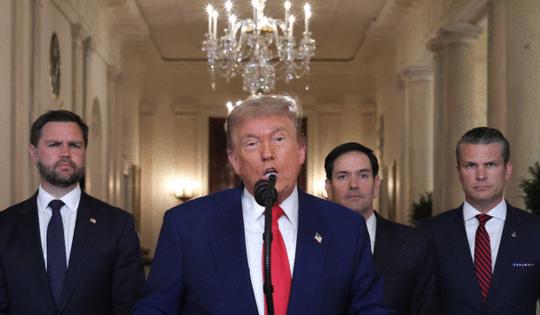Commentary: From 'obliteration' to 'enemies within' -- Trump's language echoes authoritarianism
Published in Political News
When President Donald Trump declared that the U.S. strikes “obliterated” Iran’s nuclear program, it wasn’t just a policy claim—it was an exercise in narrative control.
Predictably, his assertion was met with both support and skepticism. Yet more than a comment on military efficacy, the statement falls into a broader pattern that underscores how Trump uses language not just to communicate but to dominate.
Alongside top officials like CIA Director John Ratcliffe and Defense Secretary Pete Hegseth, Trump claimed the strikes set Iran’s nuclear ambitions back by years. However, conflicting intelligence assessments tell a more nuanced story. A leaked Defense Intelligence Agency report concluded that while infrastructure was damaged and entrances sealed, core components such as centrifuges remained largely intact. Iran had already relocated much of its enriched uranium. The International Atomic Energy Agency echoed that damage was reparable.
Given this, it's not partisan to question Trump’s sweeping claim—it's responsible journalism. And yet, he has once again lashed out at the press and intelligence agencies, accusing them of spreading “fake news” and undercutting American pilots. This reaction—deflecting criticism with outrage—is part of a now-familiar pattern in his public playbook.
Trump's reliance on inflammatory, and often dehumanizing, language is not an unfortunate quirk—it’s a deliberate tactic. Over the years, he has referred to immigrants as “vermin,” accused critics of being “poison” to America, and described political opponents as “enemies from within.” These aren’t casual insults. They are rhetorical devices with a dark history.
There are several reasons why this behavior continues to go largely unchecked:
Repetition breeds normalization
Trump’s use of personal attacks has been so consistent that many Americans have become desensitized. What once might have been shocking now barely registers.
Political survival instincts
Many of his allies remain silent out of fear—either of political fallout or of becoming his next target.
Institutional restraint
Leaders like General Colin Powell have opted not to trade insults, choosing professionalism over confrontation.
The media’s whirlwind pace
Provocative remarks often get lost in the avalanche of breaking news, limiting sustained public attention.
But language is not harmless. It shapes perception, frames debate, and influences behavior. When politicians label tax cuts as “relief” or describe policies in terms that evoke cultural identity—like “Make America Great Again”—they’re leveraging powerful emotional currents. It’s a common tool, but when wielded irresponsibly, it becomes dangerous.
A 2024 linguistic analysis of Trump’s speeches revealed a sharp uptick in violent and exclusionary terms, outpacing democratic norms and nearing the rhetoric of authoritarian regimes. What’s striking is that this trend doesn’t correspond with national crises. Rather, it appears intentional—language tailored to cast politics as an existential battle between “us” and “them.”
History warns us where this can lead. Dehumanizing language reduces the moral barriers to violence. It erodes our democratic foundations by normalizing division and incivility.
Harsh political rhetoric is nothing new in America. But the sheer volume, intensity, and repetition from someone with such a vast platform sets a dangerous precedent. The question now isn’t whether we agree with Trump’s policies. It’s whether we’re willing to accept this weaponization of language as the new political norm.
____
David Nevins is co-publisher of The Fulcrum and co-founder and board chairman of the Bridge Alliance Education Fund.
_____
©2025 The Fulcrum. Visit at thefulcrum.us. Distributed by Tribune Content Agency, LLC.

























































Comments